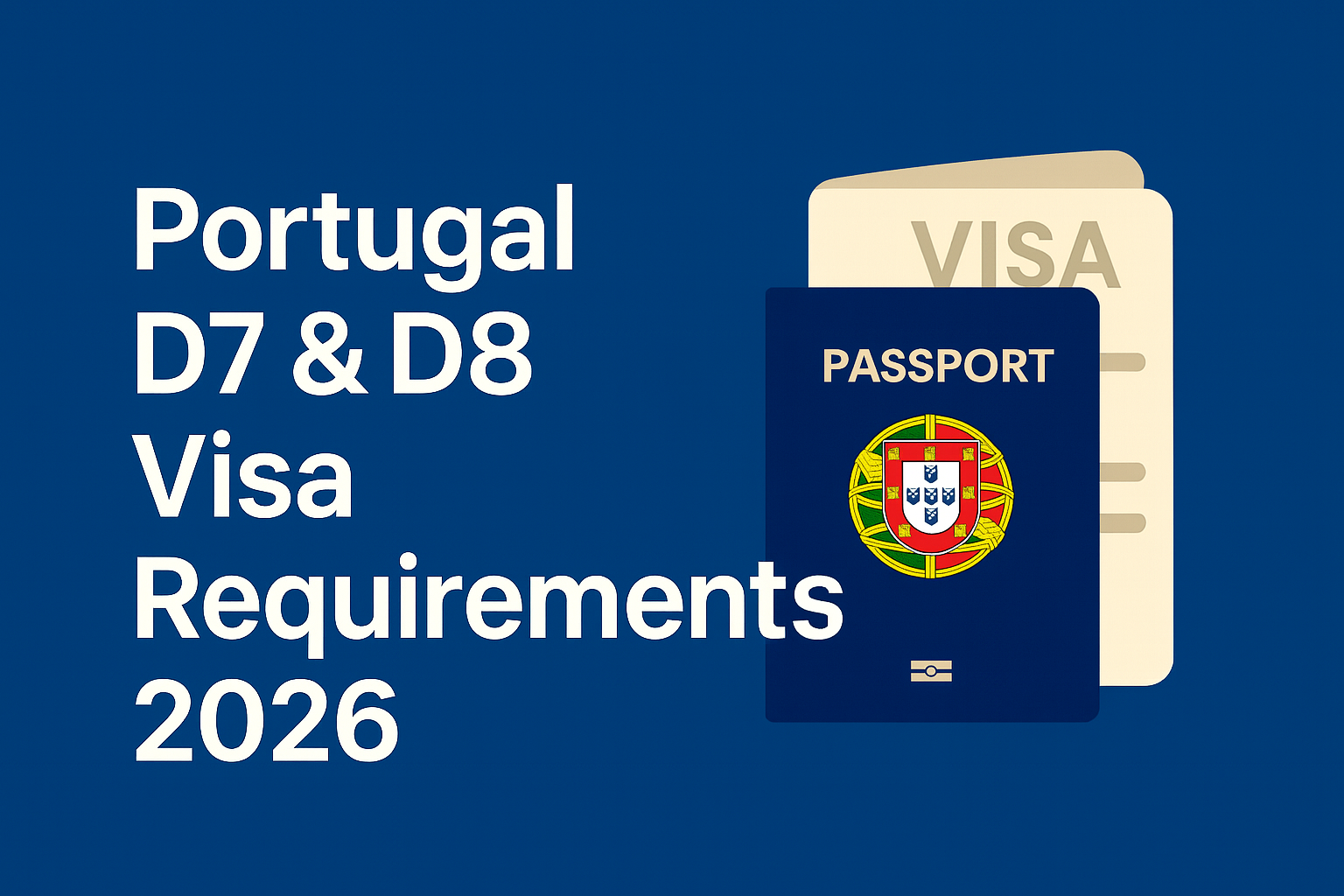Portugal Visa Financial Requirements 2026: What the New Minimum Wage Means for D7 and D8 Applicants
Portugal’s Government has proposed an increase of the national minimum wage (salário mínimo nacional) to €920 per month starting January 2026.
While this change aims to protect workers from inflation, it also directly impacts the financial thresholds required for Portuguese residence visas, particularly the popular D7 visa (passive income) and D8 visa (digital nomad).
If you are currently gathering documents or planning to apply in late 2025, it is essential to understand how this increase affects you. AIMA (Agência para a Integração, Migrações e Asilo) will assess your financial means based on the minimum wage in force at the time of your appointment, not at the time you started preparing your file.
Below, we outline the new projected requirements, explain how to prepare, and share key tips to ensure your visa or residence process remains compliant in 2026.
1. Why the 2026 Minimum Wage Matters for Visa Applicants
Under Article 77 of Law 23/2007 and its implementing regulations, all residence visas in Portugal require proof of “meios de subsistência adequados” (sufficient means of subsistence).
The Ministry of Internal Affairs updates this benchmark every time the national minimum wage changes.
Therefore, when the minimum wage increases from €870 to €920, the income and savings thresholds for both D7 and D8 visas automatically increase.
Even if you start your visa process before 2026, if your AIMA residence appointment falls after January 2026, the updated €920 base amount will apply to your case. While the earlier requirements would apply to your Visa application, it would be wise to plan ahead and show 2026 numbers.
2. D7 Visa: Updated 2026 Income and Savings Requirements
The D7 Visa is designed for retirees, investors, and individuals with stable passive income such as pensions, dividends, royalties, or rental income.
Standard Formula (unchanged)
- Main applicant: 100% of the minimum wage
- Spouse: +50%
- Each dependent child: +30%
Updated 2026 Thresholds (based on €920 minimum wage)
| Family Composition | Monthly Income Required | Annual Equivalent (12 months) | Suggested Savings in Portuguese Bank |
|---|---|---|---|
| Single applicant | €920 | €11,040 | €11,040 |
| Couple | €1,380 | €16,560 | €16,560 |
| Couple + 1 child | €1,656 | €19,872 | €19,872 |
| Couple + 2 children | €1,932 | €23,184 | €23,184 |
Note: Consulates require proof of savings equivalent to at least one year of the applicant’s total income. Keeping this in a Portuguese bank account is mandatory.
Practical Example
If you are a retired applicant living on pensions or dividends, you must show at least €920/month in recurring income for yourself, and add €460/month for a spouse and €276/month for each dependent child.
3. D8 Visa: Updated 2026 Income Requirements for Remote Workers
The D8 Visa, also known as the Digital Nomad Visa, applies to individuals who perform remote work for non-Portuguese clients or companies.
In practice, consulates and AIMA have standardized the financial requirement at 4× the national minimum wage per month.
Updated 2026 Thresholds (based on €920 minimum wage)
| Family Composition | Minimum Monthly Income |
|---|---|
| Single applicant | €3,680 |
| Couple | €5,520 |
| Couple + 1 child | €6,624 |
| Couple + 2 children | €7,728 |
Applicants must provide proof of consistent income through:
- Work contracts or service agreements with foreign clients
- Payslips, invoices, or tax returns
- Recent bank statements showing deposits from non-Portuguese sources
Tip: Build a six-month history of income at or above these levels before filing. Authorities want to see stability, not one-off payments.
4. Why You Must Plan Ahead, especially for AIMA Appointments
Many applicants begin their visa journey months in advance, but processing times can push residence appointments well into 2026.
AIMA applies the rules valid at the appointment date. This means:
- Even if your visa was issued under the 2025 threshold (€870), you may need to reconfirm financial means at €920 during your residence application.
- If your documents or bank statements are outdated, AIMA can request updated evidence before granting your residence card.
Recommendation
Plan your finances based on the higher 2026 rates. It’s easier to exceed the threshold than to scramble later to prove you meet it.
5. Document Checklist for 2026 Preparation
Whether applying for D7 or D8, you can already start preparing the following:
- Portuguese bank account: open early and maintain a balance equal to one year of your total required income.
- Proof of income: gather payslips, bank statements, and tax declarations covering the last 6–12 months.
- Accommodation: sign a rental contract or secure ownership documents.
- Health insurance: ensure private coverage remains active through the expected arrival and appointment period.
- Criminal record certificates: obtain new certificates close to submission to avoid expiration.
- Certified translations: ensure consistency in names, addresses, and dates across all documents.
6. Common Questions About 2026 Visa Rules
Q1: Do I calculate on 12 or 14 months of income?
Authorities use 12 months when calculating means of subsistence for visas. So, €920 × 12 = €11,040/year.
Q2: Will consulates apply the new amount immediately?
Consulates outside Portugal typically apply the rule valid at the time of visa submission. However, AIMA will apply the updated amount at the residence stage, even if the visa used older thresholds.
7. Strategic Advice for Early Planners
If you’re preparing documents now for a 2026 relocation, follow these guidelines:
- Overprepare financially: aim for 10–20% above the official thresholds to protect against exchange-rate swings or unexpected interpretation changes.
- Time your documentation: obtain new criminal checks and translations no earlier than 3 months before submission to keep them valid.
- Season your income evidence: collect several months of consistent deposits before applying.
- Track policy updates: the final 2026 minimum wage will be confirmed in the Portuguese State Budget.
- Stay compliant at every stage: D7 and D8 applicants can be asked for fresh financial proofs during both the visa and AIMA stages.
8. Summary Table: 2026 Financial Requirements
| Visa Type | Main Applicant | Spouse | Child | Notes |
|---|---|---|---|---|
| D7 (Passive Income) | €920/month | +€460 | +€276 | Plus savings equal to one year of total amount |
| D8 (Digital Nomad) | €3,680/month | +€1,840 | +€1,104 | Must be foreign-sourced remote income |
Final Thoughts
The expected minimum wage increase to €920 in 2026 will slightly raise the bar for Portugal’s most sought-after residence visas.
For new applicants, this means ensuring income and savings levels meet the new standards before filing. For those already in process, it means keeping documents and bank statements current through the AIMA stage.
If you are targeting a 2026 relocation, now is the time to:
- Recalculate your income and savings targets.
- Open or update your Portuguese bank account.
- Keep your financial documentation aligned with the upcoming €920 baseline.
By staying ahead of the curve, you’ll avoid surprises — and position your application for a smooth approval under the 2026 rules. Contact us now!

